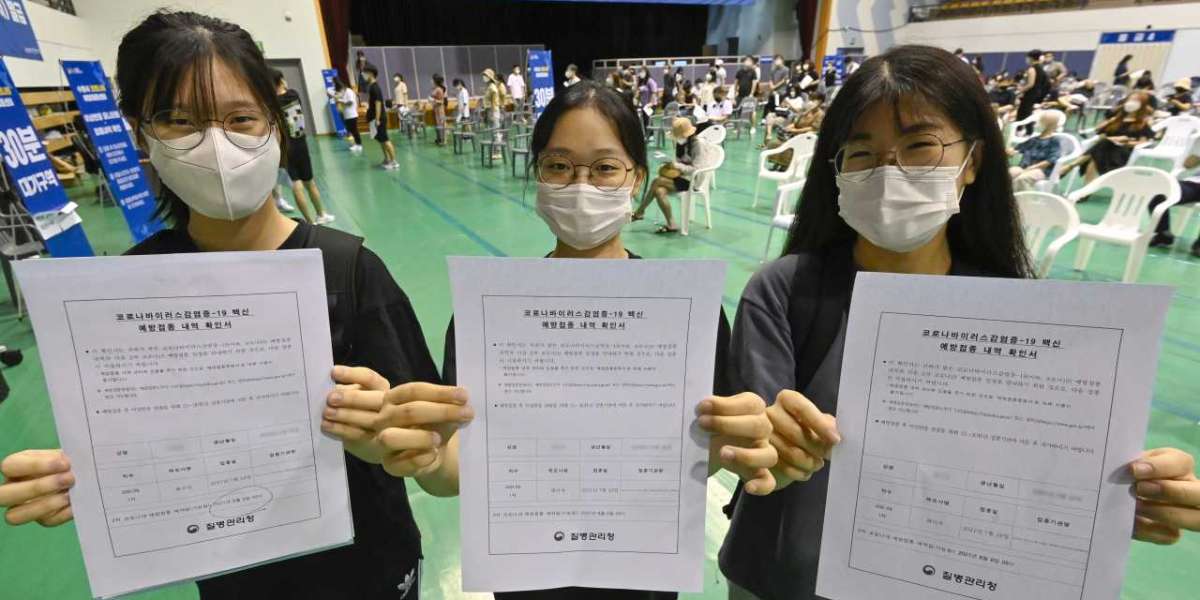It seems likely that South Korea will proceed with its contentious "vaccine pass" plans for teens, however specifics of the program may be changed in future.
Many students and parents have expressed their dissatisfaction with the government's intention to extend the vaccination certification system to those aged 12 to 18 starting on February 1, 2018.
The Ministry of Education is considering making some adjustments to the expansion of the vaccine pass system in response to public opposition.
Asked about the vaccine pass system, Education Minister Yoo Eun-hae said on a TV show with Korea Disease Control and Prevention Agency Commissioner Jeong Eun-kyeong on Monday: "Even though we have announced that the vaccine pass system will be applied to those aged 12 to 18 from February, because there are many other opinions, we will discuss the timing and the range of applied facilities."
Additionally, if there are problems following vaccination for children and teenagers, the government will share responsibility by covering the cost of medical treatment, she said, adding that the outreach vaccination program for students, which is scheduled to run until December 24, could be extended if necessary.
Teenagers in Korea have been getting vaccinated in greater numbers in recent weeks.
According to authorities, 1.48 million teenagers between the ages of 12 and 17 have received their first dose of the COVID-19 vaccine, representing 53.7 percent of the total. Approximately 1.06 million people, or 38.3 percent of the population, have received their complete vaccination.
Whatever the vaccination rate, the government's desire to extend vaccine pass applications has been regarded with skepticism, no matter how high the rate is. Even disease control specialists agreed that the government should revise its plans for the vaccination pass obligation for teenagers if it wants to keep them safe.
"The vaccine pass system has the potential to increase the vaccination rate. Parents who are opposed to vaccination, on the other hand, are more defiant than ever," Choi Eun-hwa, a pediatric infectious disease specialist who heads Korea's national advisory committee on immunization practices, said at a press conference organized by the Education Ministry on Monday. "The parents who are opposed to vaccination are more defiant than ever," he added.
'Cram schools' are considered essential amenities for children in Korea. For adults, it is analogous to going to work. According to Choi, "we need to think about whether or not it is appropriate to include cram schools in the vaccine pass system." "When it comes to immunization of teens, individuals do not have the same interests as the country. " Parental and student support should be the primary focus of the government."
Rather than forcing vaccination through the vaccine mandate system, Jung Jae-hun, a professor at Gachon University of Medicine and Science, argued that it was more important to persuade parents by providing accurate data on the vaccine's safety and efficacy rather than forcing vaccination through the vaccine mandate system.
"Introducing a vaccine pass system for teens is a way of encouraging them to get their shots." We'll then look into whether there are enough additional measures in place to encourage vaccination as well," Jung explained.
Upon being asked if it is unreasonable to extend the vaccination pass requirement to private cram schools while leaving schools out of the equation, professor Lee Jae-gap of Hallym University Medical Center responded that schools may be better ventilated than other types of establishments.
"Cram schools and study rooms do not have the same level of ventilation as schools. " During test periods, students are expected to remain in the facilities for a longer period of time," Lee explained.
Because the public is still divided on whether teenagers should be vaccinated, Lee acknowledged that the specifics of an expansion of the vaccination pass system to teens should be revised.
The three specialists agreed that vaccination of teens is necessary for their own safety since the virus situation has deteriorated over the past several weeks, according to the experts.
During his visit on Tuesday, the Education Minister also met with representatives from the Korea Association of Hakwon, which represents cram schools in Korea. A number of members of the group have expressed dissatisfaction with the government's vaccination exemption policy for teens.
The group stated during the conference that expanding the immunization pass system to cram schools would be unfair to the children who get them. Yu stated that she will look at ways to improve the measure by speaking with experts, government officials, and representatives from the cram school business.
When it comes to teens, the federal government has been hesitant to back away from the vaccine pass requirement. However, the outreach immunization campaign for pupils aged 12-18 will begin on Wednesday. Medical personnel will visit schools to provide vaccinations to pupils who have expressed an interest in becoming immunized. Some schools may require kids to visit public health clinics in order to receive vaccinations.
The vaccine program, on the other hand, is likely to be met with a low level of acceptability. According to the Ministry of Education, almost one in every six students — 83,928 out of 489,062 — who responded to a survey indicated that they would be willing to be vaccinated as part of the outreach campaign. This represents around 7% of the age group, which includes teens who do not attend school.
In Seoul, a total of 1,154 elementary, middle, and high schools participated in the vaccine program's outreach component. 952 schools, on the other hand, have less than ten kids who have chosen to get immunized. Only two schools have more than 50 children who have chosen to be immunized against the flu.
To encourage vaccination among teens in the age group who do not attend school, the Ministry of Gender Equality and Family has announced that it would organize programs with 220 sites of the Support Center for Out of School Teens around the country, according to a press release.
The number of pupils infected with COVID-19 in Seoul has been increasing in recent weeks, as the viral wave continues to spread over the greater Seoul area.
A total of 2,124 pupils from kindergarten to high school in Seoul tested positive for COVID-19 between December 6 and 12, an increase from 1,450 students a week earlier, according to the city's education administration. According to the administration, a total of 206 school administrators tested positive last week as well.
In the overall number of incidents involving kids and school authorities, 37.1 percent were transmissions from the home, while 24.4 percent were transmissions at the institution. Infection pathways that were not identified accounted for 28.7 percent of all infections. The remaining 9.8 percent of broadcasts took place in other locations.
"Children are different from adults, and experts warn that if we do not return to normalcy now, they will be negatively impacted for the rest of their lives," Kim Kyu-tae, deputy superintendent of the Seoul Metropolitan Office of Education, said during a news event on Tuesday.
The number of confirmed cases among students in Seoul is increasing, although the rate of transmission in schools remains around 25 percent, according to the researchers. "A greater number of children get affected outside of schools," Kim explained. "In order to facilitate the return to routine of schools, we will continue the full-scale, in-person class system without putting students on an extended break."



